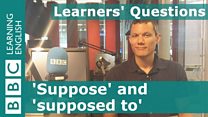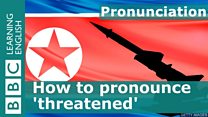Unit 28: English You Need
Exams, news, pronunciation, teachers' tips, learners' questions
Select a unit
- 1 English You Need
- 2 English You Need
- 3 English You Need
- 4 English You Need
- 5 English You Need
- 6 English You Need
- 7 English You Need
- 8 English You Need
- 9 English You Need
- 10 English You Need
- 11 English You Need
- 12 English You Need
- 13 English You Need
- 14 English You Need
- 15 English You Need
- 16 English You Need
- 17 English You Need
- 18 English You Need
- 19 English You Need
- 20 English You Need
- 21 English You Need
- 22 English You Need
- 23 English You Need
- 24 English You Need
- 25 English You Need
- 26 English You Need
- 27 English You Need
- 28 English You Need
- 29 English You Need
- 30 English You Need
Session 5
Learners' Questions
Welcome to Learners' Questions - the series where we answer your queries about the English language. Niki from Hungary has a question about the past perfect tense - and Dan's here with the answer...
Activity 1
Learners' Questions
The past simple and past perfect tenses
Niki from Hungary says: The following sentence has been giving me a headache for weeks now. Could you please give me the correct answer and justify it? When was the last time you had eaten / ate in this restaurant?
Watch the video and complete the activity

Dan
Hi guys! Dan here for BBC Learning English with this week's Learner Question. Find out what it is after this.
OK! This week's learner question comes from Niki from Hungary, who writes: The following sentence has been giving me a headache for weeks now. Could you please give me the correct answer and justify it? When was the last time you had eaten / ate in this restaurant? Two weeks ago. Ok, Niki, are you ready? Here we go.
So, in your example it has to be the past simple. When was the last time you ate in this restaurant? Two weeks ago. Now the past simple refers to finished periods of time or moments of time. It refers to a definite past. So, it’s often used with time adverbials such as last night, some time ago, in 1985, earlier today, at six o clock this morning, the last time, the first time, etc. And don’t forget that the auxiliary verb is did. For example: The first time I ever rode a horse was on my 7th birthday. And the last time was 6 months ago.
The past simple can also be used to refer to repeated past events and past habits and past states. For example: When I was small, we lived in a cottage by the sea and I played every day on the beach.
Now, the past perfect is formed using had plus a past participle verb. And we use it when we are already discussing the past, and wish to refer back to an event that happened before this point. For example: When I got to the cinema, the film had already started.
Now, the past perfect can also be used with words like after, as soon as, when and once, but usually only to emphasise that one action is quite separate and independent, and has finished before another one. Remember, everything’s in the past. So, compare these sentences: When I got out of the car, I bought a parking ticket. These two are connected. One follows the other. However, When I had got out of the car, a dog ran over to me. These two events are unconnected and separate.
I hope that answers your question, Niki. Thank you very much for writing to us. If anybody else out there has a question for Learners’ Questions, you can email us on: learning.english@bbc.co.uk. Please remember to put 'Learners’ Questions' in the subject box and your name and where you’re writing from. We get a lot of emails, guys, and we can’t answer every single one, but we do read them all. And for more information, go to our website bbclearningenglish.com. That’s it for this week’s Learners’ Questions. I’ll see you next time. Bye!
___________________________________________________________________
Did you like that? Why not try these?
________________________________________________________________________________________
Summary
The past simple tense
The past simple refers to finished periods of time or moments of time in the definite past. It can refer to past events, past states and past habits. The auxiliary verb is did. It's often used with time adverbials such as: last night, some time ago, in 1985, earlier today, at six o clock this morning, the last time, the first time, etc.
The first time I ever rode a horse was on my 7th birthday. And the last time was 6 months ago.
When I was small, we lived in a cottage by the sea and I played every day on the beach.
The past perfect tense
The past perfect is formed using had + a past participle verb. And, we use it when we are already discussing the past and wish to refer back to an event that happened before this point. The past perfect can also be used with words like after, as soon as, when and once, but usually only to emphasise that one action is quite separate and independent and has finished before another one.
When I got to the cinema, the film had already started.
To do
Try our quiz to see what you've learned about this topic.
Learners’ Questions Quiz
4 Questions
Decide if these sentences are correct or incorrect
Help
Activity
Decide if these sentences are correct or incorrect
Hint
The past perfect refers to time before the past simple. Did this person close the windows before they left? Does this make sense?Question 1 of 4
Help
Activity
Decide if these sentences are correct or incorrect
Hint
If one verb is past simple tense and the other is past perfect tense, which order to they come in?Question 2 of 4
Help
Activity
Decide if these sentences are correct or incorrect
Hint
What is the auxiliary verb for the past simple tense?Question 3 of 4
Help
Activity
Decide if these sentences are correct or incorrect
Hint
The past perfect comes before the past simple. Are these verbs in the correct order?Question 4 of 4
Excellent! Great job! Bad luck! You scored:
End of Session 5
Well, that's it for this unit! Join us again in Unit 29 for more Exam Skills, News Review, Pronunciation in the News, The Teachers' Room and Learners' Questions!
Session Grammar
The past simple tense
Past events habits and states in the definite past
The past perfect tense
Refers to an event happening before the point in the past we are discussing


